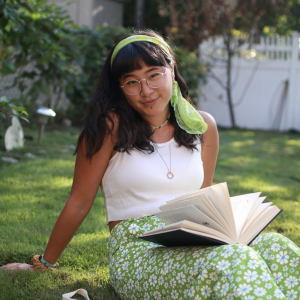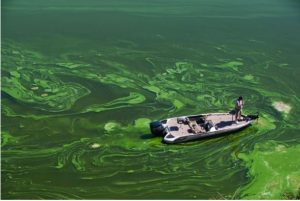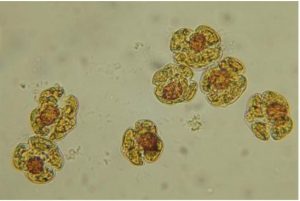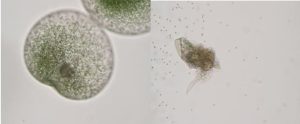Wordplay: Alex Ang
Contact
The Words: Macalester's English Student NewsletterSenior Newsletter Editors:
Birdie Keller '25
Daniel Graham '26
Callisto Martinez '26
Jizelle Villegas '26
Associate Newsletter Editors:
Ahlaam Abdulwali '25
Beja Puškášová '26
Sarah Tachau '27
Peyton Williamson '27
by Zoë Roos Scheuerman

For the last Wordplay of the year, I reached out to Alex Ang ‘22. Alex is an Environmental Studies and Creative Writing double major from New York City. She mainly writes fiction and short stories, with a focus on narratives about identity and mental health awareness. After college, she plans to pursue a PhD in Phytoplankton Ecology, as well as continue her creative pursuits through content creation and creative writing. Alex sent me an excerpt from Drowning, her novel-in-progress. The novel follows a grad student who works as a lab tech, and this excerpt is formatted like a lab report!
ABSTRACT

Figure 1. A harmful algal bloom in Lake Eerie.
The bloom comes without resistance. It grows undetected before it bursts into spirals of
vivid colors that dance on the surface (Figure 1). If you’ve never seen an algal bloom, it will
probably be the most beautiful thing you see today. Almost six years ago, it had been that way
for her. The water has no choice but to welcome the invaders, as it doesn’t interfere in the lives
of those who inhabit it. In just a few weeks, the bloom will strip the water column of oxygen,
leaving in its wake a dead zone. So often do the most beautiful things turn out to be the most
devastating.
The first time she learned about algal blooms wasn’t in her high school biology class, but
rather in a marine encyclopedia she swiped from the public library. When she finally opened the
book, now 3 months and 17 days overdue, it wasn’t the charismatic creatures of the ocean that
she was drawn to. In every movie she had ever watched, it was always the underdog that shined the brightest. Somehow someone thought that the small and seemingly insignificant subject of
algae was only worthy of half a page in a 107-page book. Most people need more than that to
spark any sort of curiosity, but for her that half a page was just enough. For several years after,
she chased the rush of flipping through hundreds of pages to find that scrap of a page that was
left just for her. With every half page, she learned something new that she took with her when
she applied to college. In undergrad, half pages became 20-page research papers and behind
those 20-pages research papers, were decades worth of experimentation and observation. She
decided then, that she wanted to know everything.
INTRODUCTION

Figure 2. Karenia brevis under a microscope
“I hate counting this shit.”
- Her thumb paused on the tally counter before looking up from the microscope at the
stranger seated next to her. Nothing surprised her anymore, especially not another cheeky white
boy from some Ivy League complaining. They came in and out like shoals of fish, always together and always under the illusion that they were bigger, stronger. She had seen plenty of
those in undergrad, and most if not all of them followed her into grad school.
“Hey, nice to meet you. I’m Lukas. I’m the new grad student,” his hands hung in mid-air
for a beat before he realized she wouldn’t return the gesture. “I’m guessing you’re new too. Have
you seen the lab tech yet?”
He poked his head behind her to see if he was missing anybody and looked straight past
her.
“I am the lab tech,” she retorted. She hadn’t meant for it to come out vicious, but this
wasn’t the first time she had to set the record straight. His eyes betrayed the rest of his face when
they widened at her reply.
“Is Dr. Davis in today?” Dr. Davis, the lab PI, and her boss was never present and if on the rare occasion he made an appearance, it was always to check in on her for some reason.
“He’s out for the moment but if there’s anything you need, I’m sure I can help you.”
“Oh, it’s nothing really. I just needed to talk to Dr. Davis about my proposal.”
He wasn’t biting, so she figured she would indulge him.
“Right. What school did you say you were from again?”
“I went to UC Santa Barbara for undergrad. What about you?”
“I graduated from Columbia University in 2016, and I’ve been here for three years.”
“Wow, that’s impressive. How do you like it here?” She pondered the question for a bit.
Three years had been enough to stifle any qualms she had about working here. It was enough to make her overlook the little things, like the lab supplies that were constantly misplaced and her PI not telling her that they were getting a new grad student. No workplace was perfect, but Lukas’ unannounced presence was worrying. Putting more than one grad student in the same lab caused interspecies competition. Gone were the times of worrying about spilled experiments and inaccurate measurements. Her mind was now solely focused on keeping the spotlight on her, as she concluded her final year to her PhD candidacy, and nothing, not even this overachieving, privileged frat boy was going to take that away from her.
“It’s alright,” she replied.
The first time she swam in the open ocean, she had a full-blown panic attack. That was
before she even knew what the word had meant. Her head disappeared under the water, and as
salt water filled her nostrils, a resounding silence followed. She was sinking, but it felt like she
was flying. Her limbs stayed frozen while her lungs burned. She blinked several times, but it
didn’t matter because she couldn’t see anything. She put all her trust into the water, as she would
so often continue to do. Rarely was her mind ever at ease, but the water gave her permission to
Forget. When she could see again, she was someplace else. Strangers in the snorkeling boat
gawked at the young girl who refused to swim, and familiar arms threw themselves around her
body. Those embraces didn’t have the same effect as the water had, but she welcomed them
anyway.
“I thought she was dead.” One of the strangers whispered to another. She pretended not
to hear him.
METHODOLOGY

Figure 3: (left) Noctiluca scintillans cell. (right) Popped Noctiluca scintillans cell.
In her undergrad lab, her favorite activity to pass the time between experiments was
playing with her subjects. Noctiluca scintillans, a harmful-algal bloom species native to the
Arabian Sea, looked less like a destructive invader and more like a speckled, green balloon
(Figure 3). Early on in her time at the Columbia University lab, did she learn that they lived
primarily in salt water. Any trace of fresh water would pop the cell immediately.
It was almost laughable. Her PIs had spent close to a decade closely studying this species
and running experiments to lead to its downfall, and here she was, pipetting fresh water and
popping cells. Rarely in science was it ever that simple. Maybe she found solace in knowing that
even the strongest walls eventually fall for the most uncomplicated reasons.